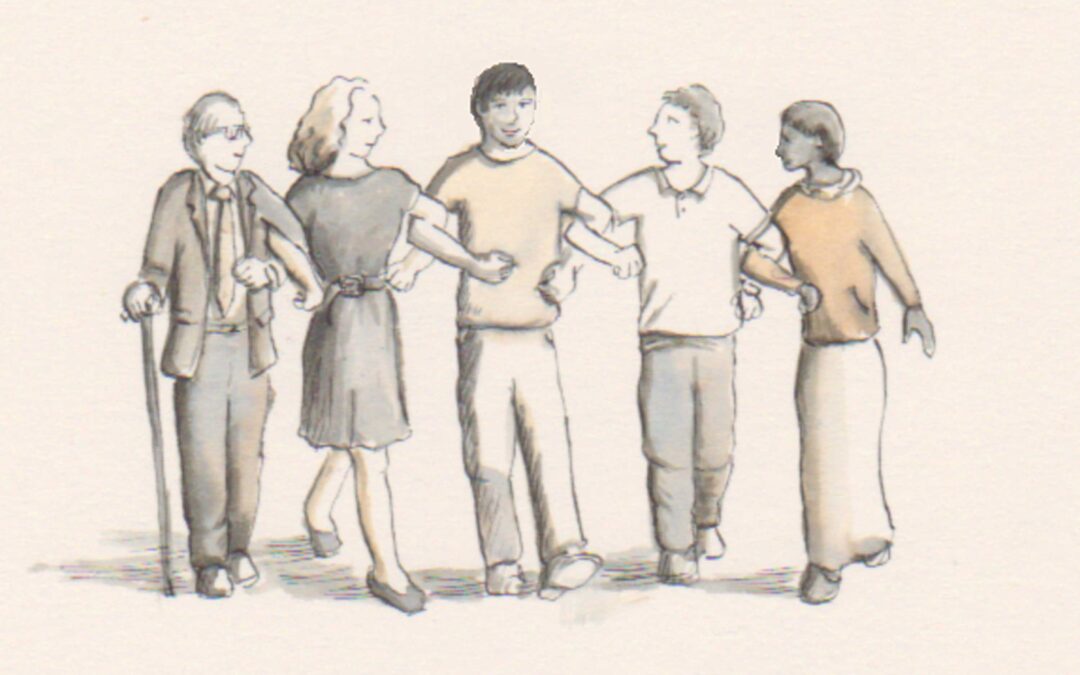In the first meeting of the Solidarities project’s Stakeholder Knowledge Exchange Board (SKEB) there was a lively discussion of what “solidarity” and “solidarities” means to us in our work. I sit on the SKEB as the representative of Right to Remain. At Right to Remain, solidarity is a key phrase and concept in our work. We have long grappled with how best to define it and how to deploy it meaningfully.
Does “solidarity” resonate?
We see solidarity as a guiding principle for our activities and theory of change – but does it actually resonate with those we work with? We explored the question of “What does solidarity mean to you?” at our gathering of grassroots asylum and migrant support groups in Sheffield in 2018 and got some fascinating and inspiring responses.
One participant commented: “It’s not about ‘help’, it’s about empowering each other.” This response gets right to a core element of solidarity – perhaps best understood when compared to “charity”. Charity is a term that suggests a somewhat hierarchical relationship, though is more frequently used in the UK, my Swedish and Danish peers pointed out. We often use the phrase “standing alongside somebody” in our work to try and indicate the supposedly equalising nature of solidarity – though more on this below. This “standing alongside” is brilliantly demonstrated in the solidarity action of the Bristol Bisons, a LGBTQ+ rugby team who accompanied teammate Ken Macharia when he had to report to the Home Office and was at risk of being detained.
Common ground
“Solidarity is building common ground.” This response to our question by one of our Sheffield gathering attendees is arguably the definitive element of solidarity – a connection built on a common cause. As another of our respondents said: “It’s recognising that what affects others affects you”. It’s also a potential challenge to calls to and actions in the name of solidarity. It’s important to reflect on who is asked to give solidarity. Often, it is those with privilege in the form of British citizenship or more secure immigration status, whiteness, or relative financial comfort. If somebody ‘acts in solidarity’ with those without this privilege, what is the common ground we are building beyond a shared humanity, a concept that can unhelpfully erase these inequalities?
A phrase with a long history
When we use the word solidarity, we are usually consciously aligning ourselves with a rich and important history. There are a multitude of examples of solidarity actions from the miners’ strike in Britain, in which people from very different backgrounds and in different countries recognised a shared struggle. The now well-known (thanks to the film Pride) example of Lesbians and Gay Support the Miners has inspired a modern incarnation in Lesbians and Gay Support the Migrants. Labour struggles have been central to defining moments of solidarity, as we see in the support of mill workers in the north of England for enslaved Africans in the United States.
“Solidarity” is, then, a word most commonly used in progressive discourse in the UK. When we deploy the phrase, we are – intentionally or otherwise – signalling our politics. When a different word is chosen to call on related behaviour, it signifies something else. This perhaps explains the choice of the term “community spirit” (itself with a specific history in Denmark) by the Danish Social Democratic Prime Minister Mette Frederiksen in a speech in response to the Covid-19 pandemic. Similarly, it would unthinkable for Conservative Prime Minister of Britain, David Cameron, to have used the term “solidarity” when outlining his vision for the Big Society in 2010, when he called on communities and volunteers to step up in previously state-run services. That’s perhaps why it can feel so unsettling to see the term used by the European Union when referring to member states refusing to take responsibility for an asylum claim under the Dublin Regulations.

Where does ‘solidarity’ get us?
Solidarity has an evocative historical meaning, but is it still useful for us today? Is it a term that has significance for traditional left trade union politics, but not beyond? The responses from people who are engaged in struggles for migrant justice suggests it still has a meaning and a purpose.
It can be challenging to give the phrase substance and detail. At Right to Remain, we have considered “What does solidarity sound like?” and “What does solidarity look like?” As Professor Ann Phoenix of University College London – a member of the project’s academic advisory board – says in this video, however, “everyone is negotiating [solidarities], implicitly, every day”.
So perhaps a clear definition isn’t what matters. What matters is that solidarity, or solidarities, are happening. The Covid pandemic has made communal action and spontaneous gestures much more difficult. Keeping the spirit of solidarity alive in a context where charitable service-provision can function more straightforwardly is a live and pressing priority.
Lisa Matthews is a Coordinator with Right to Remain and a member of the Solidarities project Stakeholder Knowledge Exchange Board.

